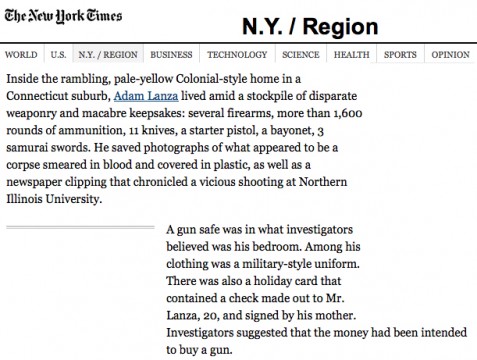Sandy Hook Warrant Goes Beyond Gun Responsibility
This week, the Sandy Hook warrant was released to the media, which listed many of the shooters’ possessions including the above itmes mentioned by the New York Times. The Times also characterized the shooter, Adam Lanza, as a “a socially fragile individual captivated by warfare video games and bent on military service” who spent a lot of time as a shut-in living in a basement.
In addition, he had been diagnosed with Asperger’s, a high functioning form of autism.
While a lot of the commentary in the media has of coursed focused on how our culture approaches guns, my mind always comes back to a different question about personal vs. corporate responsibility? Who is responsible for contributing to the emotional wholeness or social well-being of an individual in Adam’s circumstances? Does it fall to the individual, despite his or her inabilities, or to the family, who cannot ultimately control the actions of their own? Or does this, most of all, say something about society–about our failure to be neighbors, to accept and find a place for all people in our communities–even those on our margins?
Do we share some responsibility for the Adam Lanzas growing up on our street, in our schools and in our churches?
After all, one could argue isolation deserves its own place at the top of society’s greatest dangers. What do you think?


Angela H. April 2, 2013 (9:48 am)
I liked part of what you’re asking here. I don’t think it is fair for everyone to fault the family. Maybe they were neglectful at some point but they also might have exhausted all their options and taken advantage of a lot of support services available to them. It sounds like the mom in this case was determined to help her son and optimistic about him.
Is it possible some of the responsibility could also fall to medical and psychiatric professionals who treat patients like this? I don’t know when it’s an infringement on a person’s rights to require ongoing treatment and check-ins for emotional stability for example. But other people are required to check their behavior sometimes when their medical conditions could cause harm for others (I’m thinking like when someone has unexplainable seizures, their drivers license is taken away for a time).
Mark April 2, 2013 (9:51 am)
I don’t think medical professionals can be held responsible, at least not entirely.
Maybe what we are really saying is this is a community effort. It is shared responsibility. People need to be better neighbors, parents need to be diligent in finding support services, professionals need to be aggressive in making sure there is appropriate long-term care…
Instead of looking to any one party we have to say this is a society failure.
Sarah April 2, 2013 (3:11 pm)
Yes, Mark. In some villages, I’ve heard the poverty of an individual is seen as the failure of the entire society/culture.
What if we applied that same idea to emotional poverty or social poverty?
Erika Idleman April 2, 2013 (3:51 pm)
I started out wanting to argue with you by saying something about how important personal responsibility is. I think that this person like many others made deliberate choices to pursue evil that are his own responsibility.
But once I got past my all American default answer, I have to say that I do think communal responsibility (or lack thereof) is partly to blame. When it isn’t present or when it is harmful, it might nurture vulnerable angry people who never become contributing members of society.
It’s funny that we think selfishness in excluding others benefits us or makes us feel superior to them when really our failure to invest might harm the culture or town we live in. As a result the selfishness actually isn’t in our best interest.
Ryan Miles April 2, 2013 (3:53 pm)
I just don’t understand how anyone could blame society, outside of maybe video games being too violent. I can’t know what’s going on in somebody else’s basement. To act as though that burden is shared by all is illogical to me. Plenty of us work hard and are nice to people around us. We didn’t put a gun in this kids’ hands.
Sarah April 2, 2013 (4:10 pm)
Blame might be too strong of a word, Ryan, but I do think society has a chance to either positively contribute to its members, to remain neutral or to negatively contribute. And clearly when some faction of society has damaged or isolated a person, there is often damaging side effects that impact more than just that person’s family, don’t you agree?
I see a lot of incentive to be good neighbors in this, both for the well-being of the person who is embittered with apparent hate and for those who could become an innocent victim of it.